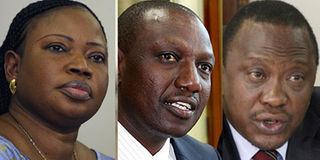ICC meets over Ruto, Uhuru trial shift bids

From left: ICC Chief Prosecutor Fatou Bensouda, Deputy President William Ruto and President Uhuru Kenyatta. Judges were set to rule on requests to move cases to East Africa on Friday. Photos | AFP and FILE |
What you need to know:
- Judges were set to rule on requests to move cases to East Africa on Friday
ICC judges met on Friday to decide whether the cases facing Kenyan suspects should be transferred to East Africa.
The judges held a plenary session to determine whether the cases facing President Kenyatta, his deputy William Ruto and Mr Joshua Sang should be partially held in The Hague, Kenya or Tanzania.
The outcome of the meeting is not yet out.
Kenya and the defence teams of President Kenyatta and Mr Ruto have applied for their trials — slated for September 10 and November 12, respectively, to be held in the region.
The three suspects are facing crimes against humanity charges stemming from 2007/08 post-election violence that claimed over 1,133 lives and displaced over 650,000.
Last month, ICC Trial Chamber V(a) recommended to the ICC Presidency that it may be desirable to hold the start of Mr Ruto’s trial and other portions thereof, to be determined at a later stage, in Kenya or, alternatively, in Tanzania.
The recommendation could have implications on the case against Mr Kenyatta, who has also applied to have it moved to a location within or near Kenya, citing office pressure.
The recommendation on Mr Ruto’s case was made following a January 24 request and after obtaining observations from the parties and participants.
In February, ICC Prosecutor Fatou Bensouda told the court that she had no objection to holding the opening of the case either in Kenya or Tanzania.
In June, the court said the recommendation made by Trial Chamber V(a) was only a step in the procedure.
Time is running out for the accused to fight for the transfer of cases. The Rome Statute makes it extremely difficult to change location of the hearings after they begin.
In May, Kenya secured an African Union resolution to petition the UN Security Council to transfer the cases to Kenya. However, there has not been any significant development since the Addis Ababa meeting.
The major challenge facing Mr Kenyatta and Mr Ruto is running the country while at the same time attending hearings that could take years, if a review of similar cases is anything to go by.
The judges’ meeting comes at a time when the number of Kenyans supporting trial of the suspects at The Hague has dropped significantly.
An Ipsos Synovate survey released on Wednesday showed only 39 per cent want trials to proceed at The Hague, down from 50 per cent last year. The poll on 2,000 people interviewed between June 23 and June 30 indicated 32 per cent want the cases brought closer home, while 29 per cent want no trials at all.




